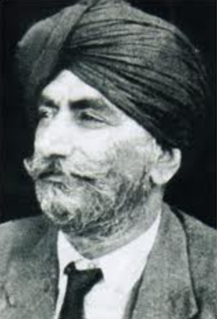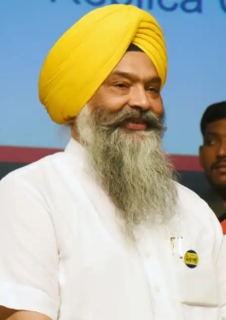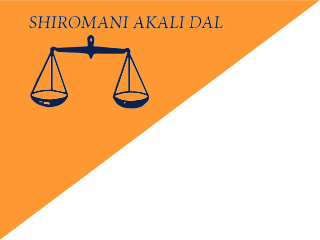Related Research Articles

The Punjabi Suba movement was a long-drawn political agitation, launched by Punjabi speaking people demanding the creation of a Punjabi Suba, or Punjabi-speaking state, in the post-independence Indian state of East Punjab. Led by the Akali Dal, it resulted in the formation of the state of Punjab. The state of Haryana and the Union Territory of Chandigarh were also created and some Pahari-majority parts of the East Punjab were also merged with Himachal Pradesh following the movement.

Gurnam Singh was an Indian politician and the Chief Minister of Punjab from 8 March 1967 to 25 November 1967, and again between 17 February 1969 to 27 March 1970. He was the first Shiromani Akali Dal Chief minister of Punjab. His ministry fell due to defection of Lachhman Singh Gill, who became the next Chief Minister with the support of the Indian National Congress. He died in an air crash in Delhi on 31 May 1973.

Lachhman Singh Gill was an Indian politician who served as the 12th Chief Minister of Punjab. He remained in this post from 25 November 1967 to 22 August 1968. He was a member of Shiromani Akali Dal(SAD), a Sikh-centered regional political party in Punjab.

Prem Singh Chandumajra is General Secretary and spokesman of the Shiromani Akali Dal (SAD) and former Member of Parliament from Anandpur Sahib and former constituency MP from Patiala seat. He is also an alumnus of Punjabi University, Patiala. He was a Member of Parliament in 11th, 12th and now of 16th Lok Sabha. He won with a low margin from Himmat Singh Shergill and Ambika Soni, who put up a tough fight.

The Shiromani Akali Dal (SAD) is a centre-right sikh-centric state political party in Punjab, India. The party is the second-oldest in India, after Congress, being founded in 1920. Although there are many parties with the description Akali Dal, the party that is recognised as "Shiromani Akali Dal Aka Badal Dal " by the Election Commission of India is the one led by Sukhbir Singh Badal. The party has a moderate Punjabi agenda. On 26 September 2020, they left the NDA over the farm bills.

Parkash Singh Badal is an Indian politician who was Chief Minister of Punjab state from 1970 to 1971, from 1977 to 1980, from 1997 to 2002, and from 2007 to 2017. He is also the patron of Shiromani Akali Dal (SAD), a Sikh-centered regional political party. He was the president of the party from 1995 to 2008, when he was replaced by his son Sukhbir Singh Badal. As the patron of SAD he exercises a strong influence on the Shiromani Gurdwara Parbandhak Committee and Delhi Sikh Gurdwara Management Committee. The Government of India awarded him the second-highest civilian award, Padma Vibhushan, in 2015.
Akali Dal – Sant Fateh Singh Group was one of several hard-line splinter groups founded by Sant Fateh Singh. Akali Dal – Sant Fateh Singh was formed in 1962. It is led by Sant Fateh Singh. The party was a Sikh-centered political party in the Indian state of Punjab. The party was created due to disagreement between Master Tara Singh and Sant Fateh Singh. The party gained control of the Shiromani Gurdwara Prabandhak Committee in October 1962. In the Gurdwara elections in January 1965, the party annexed 90 of the seats, while Master Tara Singh's party could manage only 45. In 1967 during Punjab Legislative Assembly election Party got 24 seats and with the support of other Parties and Independents under the leadership of Gurnam Singh formed People's United Front and the government but resigned after defection by Lachhman Singh Gill and then both factions merged and formed Shiromani Akali Dal on 7 October 1968 at Khadur Sahib.
Punjab Janata Party was an Indian political party.

Jagdev Singh Talwandi was an Indian politician. He was elected to the Lok Sabha in 1978 as a member of the Shiromani Akali Dal (SAD), a Sikh-centered regional political party. Talwandi was elected SAD president in 1978 and 1988. He became the President of the Shiromani Gurdwara Parbandhak Committee (SGPC) in 2000. He was elected to the Punjab Vidhan Sabha thrice in 1967, 1969, and 1972, and was inducted as a Minister of State for Development and Animal Husbandry in the Gurnam Singh Ministry and the Minister of State for Jails, Sports and Transport in the Parkash Singh Badal government. He represented Punjab in the Rajya Sabha from 1980 to 1986.

The 1952 Punjab Legislative Assembly election were the First Vidhan Sabha elections of the state when the Indian National Congress emerged as the largest party with 96 seats in the 126-seat legislature in the election. The Shiromani Akali Dal became the official opposition, holding 13 seats.

The 1957 Punjab Legislative Assembly election was the Second Vidhan Sabha election of the state when the Indian National Congress emerged as the largest party with 120 seats in the 154-seat legislature in the election. The Bharatiya Jana Sangh became the official opposition, holding 9 seats.
Akali Dal – Master Tara Singh Group was one of several hard-line splinter groups founded by Tara Singh. Akali Dal – Tara Singh was formed in 1962. It was led by Master Tara Singh. The party was a Sikh-centered political party in the Indian state of Punjab. The party was created due to disagreement between Master Tara Singh and Sant Fateh Singh. The party failed to gained control of the Shiromani Gurdwara Prabandhak Committee in October 1962. In the Gurdwara elections in January 1965, the party annexed 45 of the seats, while Sant Fateh Singh's party could manage 90. In 1967 during Punjab Legislative Assembly election Party got only 2 seats and gave their support to Akali Dal Sant Fateh Singh with other Parties and Independents and formed People's United Front and the Government under the leadership of Gurnam Singh but resigned after defection by Lachhman Singh Gill and then both the factions merged and formed Shiromani Akali Dal on 7 October 1968 at Khadur Sahib.
The 1962 Punjab Legislative Assembly election was the Third Vidhan Sabha election of the state when the Indian National Congress emerged as the largest party with 90 seats in the 154-seat legislature in the election. The Shiromani Akali Dal became the official opposition, holding 16 seats. From 5 July 1966 to 1 November 1966, Assembly was under suspension.
The 1967 Punjab Legislative Assembly election was the Fourth Vidhan Sabha election of the state. This was the first hung assembly. Indian National Congress emerged as the largest party with 48 seats in the 104-seat legislature in the election. The Akali Dal - Sant Fateh Singh became the second, holding 24 seats. On 28 August 1968, Assembly dissolved prematurely and president rule was imposed.

On 6 March 1968, the legislators from Punjab Janta Party and Indian National Congress moved a no-confidence motion against Speaker of Punjab Legislative Assembly, Joginder Singh Mann and the later development cause a Constitutional crisis in Punjab.
The 1969 Punjab Legislative Assembly election was the fifth Vidhan Sabha election of the state. This was the second hung assembly. Shiromani Akali Dal emerged as the largest party with 43 seats in the 104-seat legislature in the election. The Indian National Congress became the second, holding 38 seats. On 13 June 1971, Assembly dissolved prematurely and president rule was imposed.
United Front was a Post Poll Alliance formed after the 1969 Punjab Legislative Assembly election by Akali Dal, Jan Sangh and Left Parties as no singal Party got absolute majority in Assembly.
The 1972 Punjab Legislative Assembly election was the sixth Vidhan Sabha election of the state. Indian National Congress emerged as the victorious party with 66 seats in the 104-seat legislature in the election. The Shiromani Akali Dal became the official opposition, holding 24 seats. On 30 April 1977, Assembly dissolved and president rule was imposed.